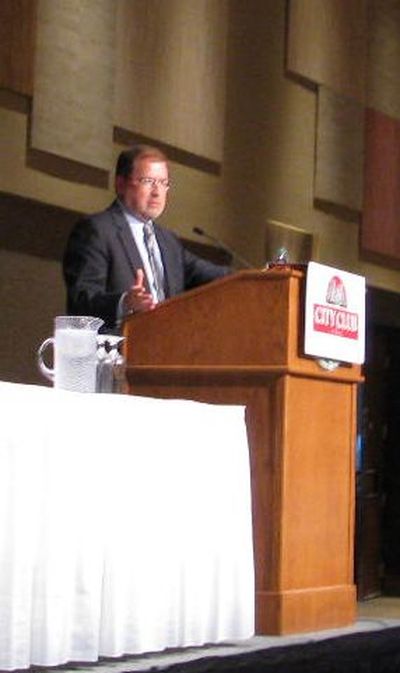Norquist: Conservatives should back immigration reform

BOISE – Grover Norquist is best known as an anti-tax activist – he wrote the no-tax-hikes pledge that’s now been signed by nearly every Republican member of Congress – but he’s also a big backer of reforming the nation’s immigration laws, a cause he’s been pushing for the past 30 years.
Norquist came to Boise on Tuesday to tell Idahoans why he thinks conservatives should support immigration reform, and drew a crowd of more than 250 to the talk sponsored by the City Club of Boise.
“Those people who tell me, ‘You know, I’m for this rule of law thing,’ I wonder where they were when we had a 55 mph speed limit,” Norquist told the crowd. “We had that into the ‘80s. … As a result, there was a great deal of illegal driving going on. And I don’t remember anyone saying, ‘First thing we do is arrest everybody who’s been illegally driving, and then we’ll have a conversation about what a normal, reasonable speed limit is.”
The Harvard MBA and president of Americans for Tax Reform spoke in support of the bipartisan bill now being debated in the U.S. Senate – which thus far, both Idaho Sens. Mike Crapo and Jim Risch have opposed – and lauded Idaho Rep. Raul Labrador for being “front and center” in the debate in the House.
“Labrador’s role has been very helpful,” Norquist said after his talk. “He’s also probably one of the most expert guys on the issue, being an immigration lawyer himself.”
Norquist’s talk was underwritten by the Idaho Business Coalition for Immigration Reform and the Idaho Dairymen’s Association, but he asked for no speaking fee and was compensated only for expenses. “It’s important,” he said. “I went to Austin, Texas and did the same thing, I went to Kansas.”
Norquist said he came to Idaho because “you had a business community that was interested … and also to be supportive of Labrador’s efforts,” and to encourage Idaho’s two senators to get on board.
He spoke with Idaho Sen. Jim Risch on Monday, but “we just talked general Idaho politics,” he said. “We didn’t talk very much about immigration. … I knew he was a no vote at that point. I sent him my stuff.”
Norquist said as a free-market conservative, he believes immigration is one of the things that’s made the United States great. “We’re going to dominate the future … because we’re a country that does immigration well,” he said. “We do it better than everybody else, and we’ve done it much better than everyone else over the course of our history.”
He said, “Everybody that came in we were told was a disaster. We were told the Japanese wouldn’t assimilate, the Chinese wouldn’t assimilate … the eastern Europeans were going to ruin everything.” But, he said, “Every group that’s come in has been an asset to the country, made us richer.”
At the core of his argument: “More people has made us wealthier, higher-income, more innovative. … The economics of this is clearer and clearer.” He said, “Do you believe people are an asset or a liability? The idea that … it makes us poorer if somebody comes in the room is not accurate in a free-market economy.”
“The way to get more revenue, to reduce deficit spending, is to have more growth,” Norquist said. “And I think the most pro-growth economic policy for the Congress at this point is immigration reform.”
He added, “Now, there’s some great tax cuts we could pass which would be helpful too, but that isn’t happening with Obama as president and Reid running the Senate.” Immigration reform, he said, is “what we can do.”
He disputed arguments that immigrants will compete with citizens for jobs or put stress on social welfare programs. “The thing people are actually arguing against is the structure of the welfare system and our entitlement system,” Norquist said. “Good point, I agree with you.” But he argued that’s “completely independent of immigration.”
The United States gains 4 million people a year who “don’t speak English, don’t want to work for a living, have to be taken care of – they’re called babies,” he said to laughter. “They have this incredible sense of entitlement.” New babies born to Americans each year also will put a future strain on Medicare, he said, but people don’t argue that’s a reason not to procreate.
Norquist said he’s been to Idaho many times over the years; the first was in 1978 when he was about 21 years old, to help craft the state’s property tax-limiting One Percent Initiative, shortly after California had passed its controversial Proposition 13. “We basically whited out ‘California’ and typed in ‘Idaho,’” he said with a chuckle.
The initiative, which sought to limit property taxes to 1 percent of value, passed, but proved incompatible with Idaho’s tax system. State lawmakers followed up by instead imposing a 3 percent cap on annual increases in local government property tax budgets that still largely stands today.